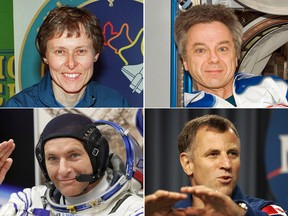From Medicine To Space Flight
"[Going into space is like going into a hospital emergency room]. You have to prepare yourself for anything and everything.""[Pilots prepare themselves of course but] for space missions to be successful, you've got to have that health-care component."Dr. Farhan Asrar, assistant professor of medicine, University of Toronto"[There are] Striking parallels between the challenges and constraints of rural medical practice and medical care for on-orbit astronauts; isolation, self-reliance, limited equipment, and impractical or impossible medical evacuation.""Similar problems often have similar solutions; that's why medical technology developed for space crews is usually relevant to medicine on Earth. And vice versa."Dafydd (Dave) Williams, emergency physician, Canadian astronaut"[Astronauts and physicians both use distinctive language] Acronyms and jargon pepper our conversations with colleagues. I smile to myself whenever I encounter a new space acronym that shares a meaning from my medical past.""[Space agencies are called upon] to recruit physicians for our unique training experiences and for the operational capabilities that we hone on hospital wards."Bob Thirsk, family physician, Canadian astronaut
 |
| NASA |
Among individuals chosen to wear the Canadian flag into orbit, military pilots and flight instructors leap to mind as the seemingly most appropriate personnel to have aboard a space flight. Chris Hadfield commanded the International Space Station and distinguished himself by his photographs and communications back to Earth through his awe of space and his manner of conveying to an interested general public just how inspiring and vast space is, along with the views back down to Earth.
But there is also the seeming anomaly of people from the general population chosen more latterly to venture where few have gone before. And in Canada's selection of astronauts, medical personnel tend to feature as prominently as pilots. In fact there has been an even selection between physicians and pilots in Canada's opportunities to choose 14 people over the past years with the potential to become astronauts; among them four pilots and four medical doctors.
Community physician Dr. Farhan Asrar, who works out of Toronto area hospitals speaks of the synergies between the mindset of concerns of a community doctor and a space flight crew member. According to Dr. Asrar, astronaut choices transitioned from the early American space programs that focused on the military and pilots, to eventually begin selecting private citizens with specialized non-military careers.
A new paper published in the journal Canadian Family Physician, co-written by Saint-Jacques and Williams states: "Outer space assets offer benefits to health care". Each of the authors contributing reflections on the comparison and lessons drawn from their own parallel careers in both medicine and space flight. Their paper underlines benefits that space technology offered to health care.
"The Canadian Space Agency's Bio-Monitor, which provides continuous health monitoring, and its Bio-Analyzer, which tests blood and other bodily fluids and provides results within minutes", among them. Sketching out as well complex conceptual similarities in medical education and training for astronauts. The strategy of trapping errors, to "contain and fix" them "before they have mission consequences."
 |
Labels: Astronauts, International Space Station, Medical Doctors, NASA, Pilots, Space Exploration

0 Comments:
Post a Comment
<< Home